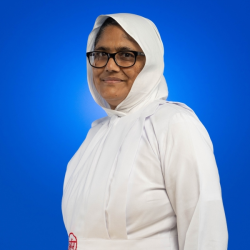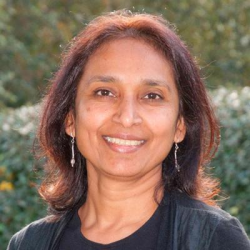
Teaching and Learning Jainism in Contemporary Society
Apr 08, 2024
8:00 - 9:30 AM PST
Presiding: Mehool Sanghrajka, Managing Trustee, Institute of Jainology

Mehool Sanghrajka is the Managing Trustee of the Institute of Jainology, leading the collaboration of all UK Jain organisations in government and inter-faith matters. He has represented the Jain faith at major national events and overseas Jain activities in Parliament. Mehool has a doctorate in Jainism and has published Jain books for the UK national curriculum. He oversees the acclaimed www.Jainpedia.org project and has lectured in Jainism at the University of London. In the 2018 New Year’s Honours List, Mehool was awarded an MBE by HM The Queen for services to the Jain Faith and to Education.
Teaching and Learning Jainism in Contemporary Society
Presenter: Samani Pratibha Pragya, Visiting Assistant Teaching Professor, Florida International University

Dr. Samani Pratibha Pragya is a scholar of Jain Studies and her specializations include Modern Jain Yoga, Comparative Religion & Philosophy, Meditation & Spirituality and Jain Terapanth lineage, to which she belongs as a Samani (saint). At present she is working as Visiting Assistant Teaching professor at Florida International University, Miami, USA. Her current research centres on the history and methods of modern Jain meditation and yoga. She received her PhD on “Prekṣā Meditation: History and Methods” from SOAS.
Yogic Practices in the Nirvāṇa Kalyāṇaka of Mahāvīra
The pañca-kalyāṇaka, or the five auspicious occurrences, mark key events in the life of all the Jinas, or ford-makers (tīrthaṅkaras). In 2024, Jains worldwide will celebrate the fifth of these auspicious events, the nirvāṇa kalyāṇaka, in the life of Mahāvīra (the great hero). This paper mainly delves into this paramount historical event within the Jain congregation and shows why teaching this is important today. Nirvāṇa is identified as “the complete extinction of the flame of karma” or “the establishment of the self in its nature”. The central argument posits that the nirvāṇa kalyāṇaka is characterised by disciplined yogic practices, namely: 1) the unification of fasting (tapoyoga) as a key component; 2) postural yoga (āsana-yoga) indicated by a particular way of sitting during the nirvāṇa kalyāṇaka; and 3) the deliverance of a discourse (svādhyāya-yoga) or knowledge-yoga (jñāna-yoga) as part of the third type of traditional Jain meditation upon realities (dharma-dhyāna). Finally, the supreme meditative yoga (dhyāna-yoga) centres on the self and conclusively stops the three modes of vocal, mental, and physical activities (yoga) in the highest state of pure meditation (śukla-dhyāna). In this state, yoga as activity culminates as a- yoga, or non-activity, which is understood as an ultimate liberation. Finally, over the exclusive astronomical conjugation (graha-yoga), there is a connection between astronomical conjunction and the nirvāṇa that occurs in a particular universal planetary movement which is documented in the Kalpa-sūtra (147).
The analysis in this paper is substantiated through Jain canonical and commentarial passages that shed light on the specific yogic practices employed by Mahāvīra during his nirvāṇa. By examining these yogic elements, this paper aims to provide a deeper understanding of the spiritual and disciplinary dimensions inherent in this historical event. This paper will also assess how teaching dhyāna-yoga today promotes a new type of spiritual practice that meets a need in Jain communities worldwide.
The analysis in this paper is substantiated through Jain canonical and commentarial passages that shed light on the specific yogic practices employed by Mahāvīra during his nirvāṇa. By examining these yogic elements, this paper aims to provide a deeper understanding of the spiritual and disciplinary dimensions inherent in this historical event. This paper will also assess how teaching dhyāna-yoga today promotes a new type of spiritual practice that meets a need in Jain communities worldwide.
Presenter: Bindi Shah, Associate Professor, Department of Sociology, Social Policy & Criminology, University of Southampton

Bindi Shah is Associate Professor in the Department of Sociology, Social Policy & Criminology at the University of Southampton, and a Fellow of the Higher Education Academy. In 2019, she was a finalist for the Vice-Chancellor's Award for Equality, Diversity and Inclusion. Bindi's research focuses on migration, religion, nationhood, citizenship, belonging with respect to British Asians and Asian Americans, the Jain diaspora, and wider migration and refugee flows to the UK, as well as on the role of social capital to foster environmental and climate sustainability and justice amongst marginalised groups. She adopts Critical Race, Feminist and Postcolonial approaches, and has expertise in qualitative and digital methodologies.
Enacting transmission of Jain dharma: Informal and formal practices in the field of diasporic Jain cultural production
Like other migrant communities, Jains in the diaspora have developed processes and organisations to preserve their ‘original’ culture, religious heritage, and identity. In this presentation I define Jain communities in the diaspora as a field of cultural production. This concept allows me to tease out actors in the Jain diaspora social space who engage in transmission of Jain dharma, in deciding what elements of the dharma are worth reproducing and who leads this reproduction. The presentation draws on in-depth qualitative research conducted between 2008-10 in Britain and USA, involving interviews with 60 young adult Jains (aged 18-30 years), participant observations at several Young Jains of America (YJA), Federation of Jain Associations in North America (JAINA), Young Jains UK (YJUK) conventions and events, and analysis of magazines, newsletters, websites of YJA and YJUK. Additional data was collected through interviews with 20 young adult Jains from both countries between 2021-22. This research found, and as others have noted, parents and grandparents are important sources of transmission of Jain rituals, prayers, diet and socialisation into Jain traditions and beliefs during childhood. Since the late 1990s, many school-age diasporic Jain children have attended Jain pathshalas, operating in private homes and later moving to established Jain centres across the United States or in rented spaces in the UK. Here I draw on Bothra’s (2018) excellent research and anecdotal evidence to highlight features of pathshalas in the US and UK contexts. From the 1990s onwards, another set of actors involved in the transmission, representation and production of Jain dharma have been YJUK and YJA. Through these organisations teenage and young adult Jains not only learn about Jain dharma but have social space to discuss its meaning and relevance in late modern societies. Crucially, these are also spaces where Jain discourse is characterised by the promotion of peer-led rather than monastic authority. My comparative analysis of the two organisations revealed that despite a transnational circulation of ideas between the two organisations, intersection of religion, ethnicity, national citizenship and migration histories in specific contexts differently shaped religious identities, religious group boundaries and religious discourses in the first decade of the 21 st century. The second decade of the 21 st century also saw the emergence of youth groups associated with the Shrimad Rajchandra Mission Dharampur. Within these groups Jain dharma is transmitted, represented, and produced differently to that of YJA and YJUK, one that is influenced by spiritual leader Pujya Gurudev Rakeshbhai Zaveri. My presentation highlights two key points: processes of cultural production not only include creation of cultural production but also reflection on how to produce it; and the boundaries of cultural fields are not predetermined by nation-states but include transnational contexts.




